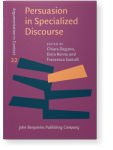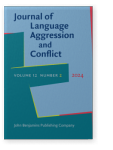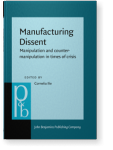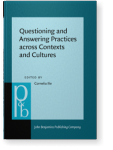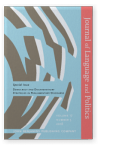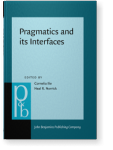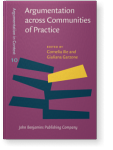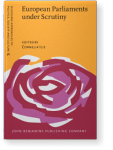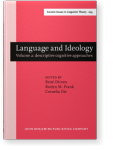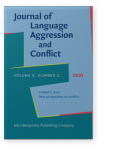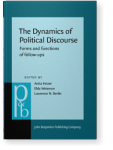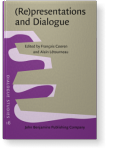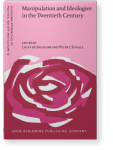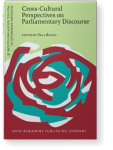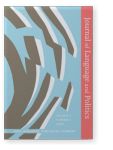Cornelia Ilie
List of John Benjamins publications for which Cornelia Ilie plays a role.
Book series
Journal
ISSN 2213-1272 | E-ISSN 2213-1280
Manufacturing Dissent: Manipulation and counter-manipulation in times of crisis
Edited by Cornelia Ilie
[Pragmatics & Beyond New Series, 339] 2024. vi, 311 pp.
Subjects Communication Studies | Discourse studies | Pragmatics
Questioning and Answering Practices across Contexts and Cultures
Edited by Cornelia Ilie
[Pragmatics & Beyond New Series, 323] 2021. vi, 316 pp.
Subjects Communication Studies | Discourse studies | Pragmatics
Democracy and Discriminatory Strategies in Parliamentary Discourse
Edited by Karin Bischof and Cornelia Ilie
Special issue of Journal of Language and Politics 17:5 (2018) vi, 127 pp.
Subjects Communication Studies | Discourse studies | Pragmatics
Pragmatics and its Interfaces
Edited by Cornelia Ilie and Neal R. Norrick
[Pragmatics & Beyond New Series, 294] 2018. vi, 313 pp.
Subjects Communication Studies | Discourse studies | Pragmatics
Argumentation across Communities of Practice: Multi-disciplinary perspectives
Edited by Cornelia Ilie and Giuliana Garzone
[Argumentation in Context, 10] 2017. vi, 345 pp.
Subjects Communication Studies | Dialogue studies | Discourse studies | Philosophy | Pragmatics | Sociolinguistics and Dialectology
European Parliaments under Scrutiny: Discourse strategies and interaction practices
Edited by Cornelia Ilie
[Discourse Approaches to Politics, Society and Culture, 38] 2010. vi, 378 pp.
Subjects Communication Studies | Discourse studies | Pragmatics
Language and Ideology: Volume 2: descriptive cognitive approaches
Edited by René Dirven †, Roslyn M. Frank and Cornelia Ilie
[Current Issues in Linguistic Theory, 205] 2001. vi, 267 pp.
Subjects Cognition and language | Pragmatics
2024 Chapter 3. Manipulating citizens’ beliefs and emotions: Consensus-seeking and dissensus-generating tactics in crisis management Manufacturing Dissent: Manipulation and counter-manipulation in times of crisis, Ilie, Cornelia (ed.), pp. 85–118 | Chapter
In times of crisis, such as the Covid-19 pandemic, social divisions caused by dissensus about controversial government policies escalate due to widespread uncertainty and anxiety, fuelled by the proliferation of covert and overt manipulative strategies in official discourses. Like citizens in… read more
2024 Crisis manipulation: Discourse- and argumentation-based approaches Manufacturing Dissent: Manipulation and counter-manipulation in times of crisis, Ilie, Cornelia (ed.), pp. 1–23 | Chapter
2021 Questions we (inter)act with: Interrelatedness of questions and answers in discourse Questioning and Answering Practices across Contexts and Cultures, Ilie, Cornelia (ed.), pp. 1–32 | Chapter
2021 Discussion, dispute or controversy? Paradigms of conflict-driven parliamentary practices New perspectives on conflict, pp. 237–270 | Article
As parliamentary debates increasingly display rising levels of political conflict, the polarized and aggressive polemical exchanges in Prime Minister’s Questions are impacting the current agenda-setting and consequently public perceptions and assessments. To get a deeper understanding of the… read more
2021 Evasive answers vs. aggressive questions: Parliamentary confrontational practices in Prime Minister’s Questions Questioning and Answering Practices across Contexts and Cultures, Ilie, Cornelia (ed.), pp. 35–70 | Chapter
The goal of this investigation is to scrutinize the interplay of parliamentary questions and answers in the notoriously polarized PMQs (Prime Minister’s Questions), in terms of three pragmatic criteria: topical focus, addressed target(s), and pursued goal(s). A pragma-rhetorical analysis… read more
2018 Democracy and discriminatory strategies in parliamentary discourse Democracy and Discriminatory Strategies in Parliamentary Discourse, Bischof, Karin and Cornelia Ilie (eds.), pp. 585–593 | Editorial
2018 Pragmatics vs rhetoric: Political discourse at the pragmatics-rhetoric interface Pragmatics and its Interfaces, Ilie, Cornelia and Neal R. Norrick (eds.), pp. 85–119 | Chapter
Pragmatics and rhetoric display a range of commonalities and convergences in that both are concerned with discursive and extra-discursive strategies that enable the negotiation and re-negotiation of context-situated meaning, and the co-performance of interpersonal and institutional relationships… read more
2018 “Behave yourself, woman!”: Patterns of gender discrimination and sexist stereotyping in parliamentary interaction Democracy and Discriminatory Strategies in Parliamentary Discourse, Bischof, Karin and Cornelia Ilie (eds.), pp. 594–616 | Article
After a record number of women were elected to the House of Commons in 1997, many incidents of sexism and abusive behaviour were reported. The aim of this article is twofold: on the one hand, to scrutinize the mechanisms and effects of sexist discrimination and stereotyping of women MPs in the… read more
2018 Introduction: Pragmatics and its interfaces Pragmatics and its Interfaces, Ilie, Cornelia and Neal R. Norrick (eds.), pp. 1–10 | Introduction
2017 Chapter 4. Questioning the questionable: Arguments and counter-arguments in political accountability interviews Argumentation across Communities of Practice: Multi-disciplinary perspectives, Ilie, Cornelia and Giuliana Garzone (eds.), pp. 73–98 | Chapter
The aim of this chapter is to identify and scrutinize the mechanisms of overt and covert argumentation and counter-argumentation that underlie the question-answer turn-taking structure in a political accountability interview conducted as part of the BBC HARDtalk programmes. The political… read more
2017 Cross-disciplinary perspectives on context-specific argumentation practices Argumentation across Communities of Practice: Multi-disciplinary perspectives, Ilie, Cornelia and Giuliana Garzone (eds.), pp. 1–18 | Chapter
2015 Follow-ups as multifunctional questioning and answering strategies in Prime Minister’s Questions The Dynamics of Political Discourse: Forms and functions of follow-ups, Fetzer, Anita, Elda Weizman and Lawrence N. Berlin (eds.), pp. 195–218 | Article
In parliamentary interaction, more than in other types of institutional dialogue, follow-ups indicate how UK Members of Parliament (MPs) negotiate not only the pros and cons of topic-related issues, but also their status, roles and power positions. While a follow-up is normally conditioned by… read more
2012 Representing gender in parliamentary dialogue: Are there any cross-cultural stereotypes? (Re)presentations and Dialogue, Cooren, François and Alain Létourneau (eds.), pp. 59–82 | Article
To understand the emergence of gender roles in parliamentary interaction, it is useful to compare the ways in which female and male MPs use and misuse addressing strategies. Behaviours and interactional performances are interpreted in significant ways: by being acknowledged and appreciated, by… read more
2010 Introduction European Parliaments under Scrutiny: Discourse strategies and interaction practices, Ilie, Cornelia (ed.), pp. 1–25 | Article
2010 Identity co-construction in parliamentary discourse practices European Parliaments under Scrutiny: Discourse strategies and interaction practices, Ilie, Cornelia (ed.), pp. 57–78 | Article
2010 Managing dissent and interpersonal relations in the Romanian parliamentary discourse European Parliaments under Scrutiny: Discourse strategies and interaction practices, Ilie, Cornelia (ed.), pp. 193–222 | Article
2005 An integrated approach to the analysis of participant roles in totalitarian discourse: The case of Ceausescu’s Agent roles Manipulation and Ideologies in the Twentieth Century: Discourse, language, mind, Saussure, Louis de and Peter J. Schulz (eds.), pp. 191–211 | Article
2004 Insulting as (un)parliamentary practice in the British and Swedish parliaments: A rhetorical approach Cross-Cultural Perspectives on Parliamentary Discourse, Bayley, Paul (ed.), pp. 45–86 | Article
2003 Discourse and metadiscourse in parliamentary debates Parliamentary Discourse, pp. 71–92 | Article
Oral metadiscourse is envisaged in the present study as a set of rhetorically structured communicative and interactional strategies used by speakers to signal, highlight, mitigate, or cancel parts of their ongoing discourse and their varying relevance to different addressees and/or audience… read more
2001 Introduction Language and Ideology: Volume 2: descriptive cognitive approaches, Dirven, René †, Roslyn M. Frank and Cornelia Ilie (eds.), pp. 1–26 | Miscellaneous
2001 Unparliamentary language: Insults as cognitive forms of ideological confrontation Language and Ideology: Volume 2: descriptive cognitive approaches, Dirven, René †, Roslyn M. Frank and Cornelia Ilie (eds.), pp. 235–264 | Article
